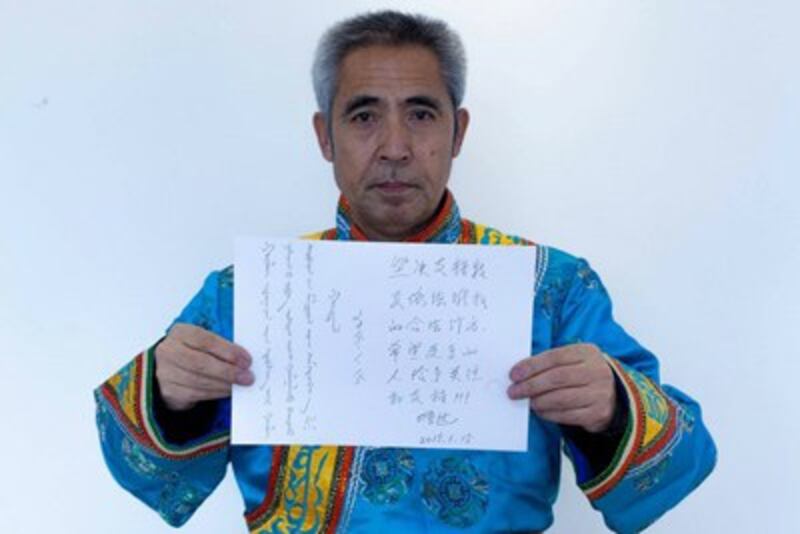Chinese authorities in Inner Mongolia have jailed four ethnic Mongolian herders for their role in "illegal demonstrations" following weeks of protests by communities whose grazing lands have been taken away by the government.
Four protesters from Durbed Banner (in Chinese, Siziwangqi) were given 15-day administrative sentences, a punishment handed by police to perceived troublemakers without the need for a trial.
Dozens of herders have gathered in government offices in Durbed's Ulaanhua township in protest at the Jan. 31 detention of Odonhuaar, Davshilt, Naranhuaar and the Feb. 1 detention of Adiyaa, rights groups and relatives said.
"Three people were detained for 15 days [recently], and then on Feb. 1, the police detained another person, called Adiyaa," Enhebatu Togochog, director of the New York-based Southern Mongolian Human Rights Information Center (SMHRIC), told RFA.
Davshilt's daughter said she was concerned for her parents, especially her mother's health.
"The procuratorate called my parents [Davshilt and Odonhuaar]...so they went out, the prosecutors issued a warrant, and then the police and prosecutors arrested them," she said.
Calls to the Durbed Banner police department rang unanswered during office hours on Monday.
The detentions are linked to a street protest in Ulaanhua on Jan. 30, when some 200 herders marched with banners calling for the return of their grasslands and the "plunder" of their lands.
The Durbed herders were evicted from their lands under an "ecological migration" policy aimed at limiting overgrazing and stave off the southward creep of the Gobi Desert into China's grasslands.
But herders say desertification isn't caused by grazing, and that officials use it as a pretext to clear the way for mining and forestry operations.
The prosecution document issued to Odonhuaar, a copy of which was seen by RFA, accuses her of "being involved in illegal gatherings and demonstrations organized by Davshilt."
Ignoring demands
The detentions come amid escalating herder protests in recent weeks, which have also taken place in Sunid Right Banner (in Chinese, Suniteyouqi), Urad Middle Banner (in Chinese, Wulatezhongqi), as well as in Shiliin-hot and Abag Banner (in Chinese, Abageqi).
"Chinese authorities continue to ignore herders' demands in the face of protests entering their fourth week," SMHRIC said in a statement e-mailed to RFA on Tuesday.
In contrast with recent silent protests and petitions in Beijing and the regional capital Hohhot, protests at the local level have become more vocal, with banners and chanting, it said.
On Jan. 31, some 200 herders from the neighboring Sunid Right Banner also took to the streets of the banner capital Saihantal township, demanding a meeting with government officials, who sent in riot police to quell the protest.
At least five demonstrators were arrested and dozens were beaten up, SMHRIC said.
The Sunid herders were forced off their traditional grazing lands to make way for the expansion of the People's Liberation Army (PLA)'s Zureh Military Training Base, offering "neither proper compensation nor adequate housing," it said.
The group said it had also received reports that four ethnic Mongolian activists who showed online support for the protests have been detained for brief periods before being released.

Bank account frozen
Meanwhile, the wife of veteran Mongolian dissident Hada said she has been unable to withdraw money sent by well-wishers from around the world to help the family which has no income since her husband's release from detention last November.
"The bank teller showed me a copy of a directive issued to their bank ordering the account frozen," Xinna told RFA. "They had filled in the name Xinna, but the reason for the order was left blank."
Overseas Mongolians have been raising funds online to help Hada, whose political activism has always been driven by the herders' cause.
"A lot of ethnic Mongolians overseas had donated this money," Xinna said, adding that the donations amounted to some U.S. $2,000.
The couple's son Uiles said the family is now under increasing pressure to sign agreements with police promising not to speak out publicly about Hada's treatment, to give interviews to overseas media, nor to lodge appeals and lawsuits against the authorities.
"If the police have conclusive evidence that we are a family of separatists, then why don't they arrest us?" he said.
"Instead, they are closing off every option that is open to us."
Uiles said he had tried to find work, but that one potential boss had been threatened with the closure of his business if he hired him.
Ethnic Mongolians, who make up almost 20 percent of Inner Mongolia's population of 23 million, are increasingly complaining of widespread environmental destruction and unfair development policies in the region.
Clashes between Chinese companies and herding communities are common in the region, which borders the independent country of Mongolia.
Reported by Hai Nan for RFA's Cantonese Service, and by Qiao Long and Yang Fan for the Mandarin Service. Translated and written in English by Luisetta Mudie.
